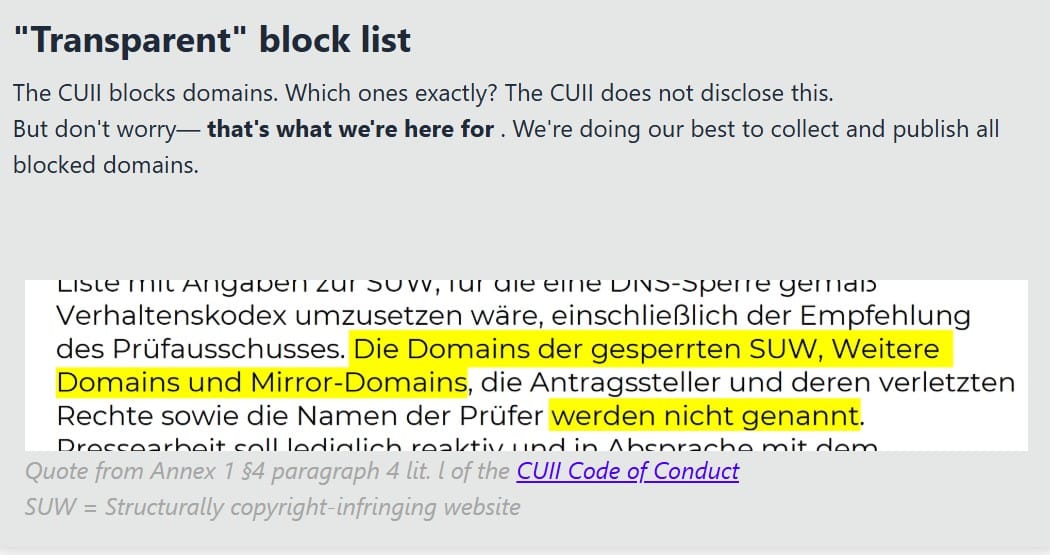 In 2021, German Internet providers agreed to voluntarily block structurally infringing pirate sites.
In 2021, German Internet providers agreed to voluntarily block structurally infringing pirate sites.
The ISPs teamed up with rightsholder groups and launched the “Clearing Body for Copyright on the Internet” (CUII), which became responsible for handing down blocking ‘decisions’.
In June, signatories to the blocking agreement amended their code of conduct, which fundamentally changed how CUII operates. Going forward, all blocking action will take place after a court orders at least one Internet provider to block a website. While the addition of judicial oversight is laudable, transparency remains lacking.
Fitgirl Repacks, RPG Only, and Anna’s Archive
In late August, many people noticed that the popular game piracy site FitGirl Repacks was unavailable through many German ISPs. The blocking action had all the hallmarks of an official blockade, but there was no mention of a new order on the CUII website.
The same was true for RPG Only, which was blocked last month, again without an official notice at the time. This pattern repeated itself a few weeks later, when shadow library Anna’s Archive was presumably added to the German blocklist.
These ‘surprise’ blockades were discussed on social media, attracting attention from German news site Tarnkappe. However, all this time there was no official confirmation from CUII, the organization responsible for coordinating blocking efforts across ISPs and transparently informing the public.
Needless to say, this lack of communication doesn’t make it easier for the public to follow these developments. It also makes it harder for the press to accurately explain what is going on.
Transparency on Demand
Last week, there appeared to be some movement in the transparency process as CUII published official confirmation on the RPG Only blockade. It confirmed that DNS blocking was implemented following an order by the Cologne court, which deemed the site to be structurally infringing.
There is no mention of the complaining rightsholder, but the German game industry group is a member of CUII, so that’s a likely candidate.
While researching the matter, we looked for official confirmation on the FitGirl and Anna’s Archive blocks, but nothing appeared. At least, not until we asked.
We asked CUII for clarification on September 30 and the next day, official confirmation of the FitGirl and Anna’s Archive blockades was published on the CUII website.
CUII’s Head of Office, Sevinc Demirova, subsequently responded to our questions. She confirmed that the Anna’s Archive blockade is based on an order from the Cologne Regional Court. The block against FitGirl Repacks, however, predates the updated agreement and was implemented based on a decision from CUII’s own panel.
While the documents themselves are dated earlier, our observation of CUII’s website shows the notice for RPG Only was published on September 24. The confirmations for FitGirl and Anna’s Archive only appeared on October 1, the day after our inquiry.
Not tipping Off Pirate Site Operators
In the case of the FitGirl blockade, the official announcement comes more than three months after the order was signed, which is a rather long delay.
After requesting an explanation for this delay, Sevinc Demirova clarified that their goal is to “ensure the greatest possible transparency,” but that its orders are only published after all participating ISPs have implemented the blocks.
According to Demirova, they do this for two reasons. First, to ensure that the public documentation accurately reflects the real-world status of the blockade. Secondly, it’s a tactical measure to prevent site operators from learning about a block before all of their domains are rendered inaccessible.
While these procedural and strategic reasons explain the delay, the effect on the public remains the same: a period of uncertainty where blocks are active without any official, public confirmation.
Opaque Transparency
The delay between the implementation of the blockades and CUII’s official publication is not the only point of frustration. Transparency is rather limited too, as the names of the parties involved, including the rightsholders and the targeted domain names, are all shielded from the public.
The underlying court orders are often anonymized as well, which is typical in Germany. Moreover, these orders are not made publicly available.
The website of the Regional Court in Cologne explains that interested parties can request a copy at NRWE, which we did last week. On Monday, NRWE informed us that they don’t have a copy, redirecting our inquiry back to the court. Since then, we haven’t heard anything new.
Opaque transparency is not very useful, to say the least. Ideally, blocking schemes should publish a full list of all currently blocked domain names so outsiders can scrutinize the measures and correct errors, which do happen.
Amidst all the opacity, there remains a glimmer of transparency. A German student previously launched CUIIListe, a monitoring portal where all blocked domain names are monitored. This homebrew transparency portal picks up blocked domains long before they are confirmed by CUII.

From: TF, for the latest news on copyright battles, piracy and more.
Powered by WPeMatico
